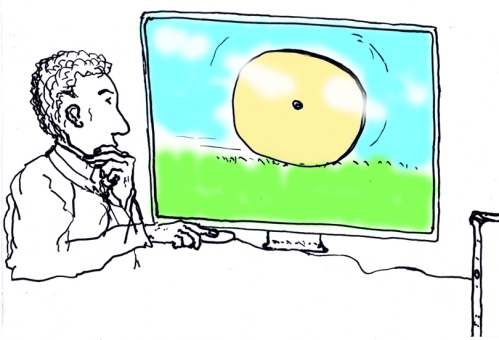

In the modern era, we have seen people at a large scale loose belief in a god and holy scriptures. Especially in Europe and other countries of the west. However, scriptures like the Bible and Qur'an mention disbelief in God, and there are historic accounts about atheists during the Caliphate of 'Ali, son in law of the prophet Mohammed (pbuh). Every Biblical prophet had to cope with non-believers, this fact being the reason behind their mission: Trying to familiarize their people with God. So non-belief in God is not new, though nowadays it is (or seems) more widespread.
The reasons for disbelief are not only disbelief in a deity altogether, and disbelief in scriptures that proved to be incompatible with scientific knowledge. There is also a strong disbelief in the role of the clergy and a sense of disappointment in God as a source of goodness. The second reason – the influence of science – is in the west a relatively modern phenomenon. However, the first cracks in the Church's infallibility appeared during Renaissance – perhaps the most famous crack was Galilee's theory of the earth being round in stead of flat. The other three reasons for disbelief are more universal and exist in probably any culture and historical period. Not every person is interested in a truth that cannot be proved, but why is this the case? Why does one person accept God and does the other reject Him? And why do some people accept God in spite of natural disaster (like early death or tsunamis), or human corruption in His most prominent servants? Why do these very same phenomena scare others away from God? It seems impossible to solve, and the issue makes clear that belief is a matter of personal perception. Believers see their own existence and perception as sufficient proof for the truth of their beliefs – a thing that non-believers cannot accept. Rejection of the metaphysical world, however, cannot be proved to be solid judgement either. There is no proof that a metaphysical world doesn't exist. There is nothing wrong with rejecting holy scriptures that proved to be untruthful, nor with rejecting a corrupt religious organization in society, but that is of quite a different order than metaphysics. The scientific approach has many merits, but it is a limited one. It does not answer the questions, nor does it display the places that are beyond our shared observation.
So disbelief in a deity basically is another form of belief, no matter how sophisticated it may be worded. The question that follows, is: what is wrong with disbelief being another form of belief? Belief in a deity is a subjective, perceptive approach to life, but so is atheism. Belief stops and knowledge begins as soon as a phenomenon has been empirically observed and displayed to others. This is not (some say not yet) the case with the metaphysical world of God. Belief has become the bad apple in not only the west – it is blamed for oppression of the free will and for hindering scientific, economic and political development everywhere. There is some truth to that, as we have seen religious clergy in oppressive roles, but do the people really find more freedom in non-religious systems? The first thing we should acknowledge, is that we know many secular systems, but very few non-religious, atheistic systems. Communism is an atheistic political system, but apart from communism, there aren't many. Most other countries allow a role for religious political parties in their political landscape and even in their legislation. Almost every country acknowledges national religious holidays, to name something. We could go a step further: creating a formal atheistic state is incompatible with our nowadays most appreciated form of government, namely the secular state. It implies that atheism is the state doctrine and favors atheism over belief in God. What can we say in defense of the atheistic state as a liberal and equitable system? We can defend such a choice once atheism has been proved to be the truth beyond any doubt.
Contrary to what many think, disbelief in God is not a new phenomenon. The Biblical and Qur'anic scriptures give us many definitions and descriptions of disbelief in God. The Qur'an also accentuates that nonbelievers see their rejection of God as some form of modernity. What is modern about disbelief in a god? Religious scriptures are old, perhaps they are the oldest we possess. It appears that the first religious revelation came with the first man and that the first man raised us to be religious. The unprovability of God's existence, of which the Bible even makes a formal statement since Babel Tower, makes it likely that also in early days people came to doubt His existence. However, belief in God seems to have preceded rejection, hence the modern aspect of disbelief. This brings us to a second question: What is more difficult, to believe or to disbelieve in a god? Is disbelief reinventing the wheel, or is it an expression of creativity, sophistication and independence?
If we want to answer whether disbelief in God is just another form of belief or a creative and modernizing force, we should think about the aim of divine revelation.
Divine revelation in the first place intends to introduce the deity to man. Who is He (or they, or She), what is His plan for His creation, what is man's place in it, what future has He in store for both individual people and mankind.
Secondly, every revelation gives more or less detailed rules for how people should live together, and how they may or should communicate with the deity. If God is approached the right way, following established protocol, a relationship between God and man will develop. Rules for cohabitation of people with each other and with other creatures are important components of the ritual worship of God. Religious rules are to be applied for the whole life span, and therefore they demand discipline. We may classify discipline among the difficult aspects of belief. One of atheists' main criticism against religion is its dislike of obedience to God and religious verdicts. It is seen as something not belonging to the naturally curious human mind to believe in an invisible abstraction and therefore part of an oppressive tradition. The idea of obeisance to an abstract, non-empirical concept, God, is unacceptable to atheists, especially since there are more than one of these abstract concepts, religions. Only concrete, absolute truths should be enforced on society. Hence the modern preference for a secular system, a preference now also existing among many believers. The idea of not formally enforcing abstract concepts is not a prerogative for atheists, however.
On the other hand, not only atheists consider religious belief a less committal approach to life. It seems easier to believe in something of which absolute knowledge is absent than having to prove it. Therefore we can afford some freedom in our actions. Knowledge demands precision, whereas faith doesn't. We don't absolutely know if God exists, so how much do we need to worry about God's judgement or God's sanction to disbelief. Plus we do not absolutely know to what extend God 'needs' our commitment and obedience. Is God Himself enough, or does He really need our love and prayers? Is our life, our future in God's power? Will God grant fulfillment of our wishes for the hereafter, as we can't reach Him directly? The by nature easygoing commitment of religious belief gives great joy and space to the believer, which is the easy aspect of belief. Belief invites creative people to express and visualize their beliefs, and this visualization makes it possible to share beliefs with others. This challenge has inspired people through the ages to great works of art. However, also the creative process not only needs discipline; the believing artist inevitably stumbles upon the impossibility to observe the deity, the soul, mental processes, and the metaphysical world. Yet faith is a source of creativity and this creativity is perhaps the most attractive aspect of faith.
Non-absolute commitment to the faith, however, also explains the phenomenon of the corrupt and oppressive clergyman who does not live by his own religious rules – even he does not really seem to fear. Persistent faithfulness seems to be difficult, even for the clergy, even though the clergyman, as much as anybody else, has his own personal integrity and discipline. Or lack of it, all depending on the individual, when surrendering to invisible values. This commitment to the principles of an abstract concept, and the discipline and integrity it demands, is the difficult aspect of faith. Therefore it is not as self-evident as it seems: Religious belief as the lazy alternative to independent thinking.
Obedience to God, scripture and religious clergy seems a non-creative, easy way out of the exercise of forming oneself a life philosophy by free thinking and research. This is why atheists see believers as uncreative, credulous people. Those who believe can rely on the comfortable guidance of an expert organization. The believer has, in the view of the non-believer, an easy. Every question about every aspect of life is promptly answered by scriptures and their highly schooled authoritative commentators. Creativity, independent thinking, acquiring knowledge; and perhaps most of all; self determination are off-limits to believers – unnecessary also, in the atheist view. Indeed this makes non-belief in a god a difficult choice: What should come in place of a religiously inspired society and life philosophy? Can we really, by our own force, invent a system of values and rules, let alone make it consistent? A believer will answer to this question: Everything we think and act, our entire being, is under divine guidance, even when the deity grants us freedom. Therefore man cannot act independently, or at best within restricted fields, where the deity allows it. The non-believer says: Man emerged from natural processes where no god was ever involved. Man must on his own force build a just society and not hide himself behind self-invented, non-empirical philosophies, which are no more than organizational simplification instruments – harmful to detergent philosophies and most of all, to the truth. In the non-religious view, truth is no more than empirical observation and the conclusions thereof; everything else is mere opinion, "every person's own truth", or the unknown yet to be discovered. Non-believers are especially proud of how scientific achievement could improve comfort for man, and all this apparently against the sayings of the religious scriptures. Indeed technological and medical knowledge could enervate parts of the religious scriptures. And also traditionally low ranking people could emancipate from religious taboos that proved to be incompatible with reality. Therefore, much seems to plea in favor of the non-religious outlook. However, still no answer comes to the question why many topics in religious scriptures are dealt with adequately, as shown by archeological findings. Nor to the main question that science cannot answer: What does the secret room behind the blind door look like. So it is not necessarily true, that religious belief offers more ease and security than atheism. Too much emphasis is also laid on the social aspect of religion and too often people forget the most important personal choice that believers must make every time again. The choice for a religion is a choice for an abstract metaphysical world, not for a group culture, even though that may be a natural choice, especially when we choose for our family's tradition.
Comments
Post a Comment